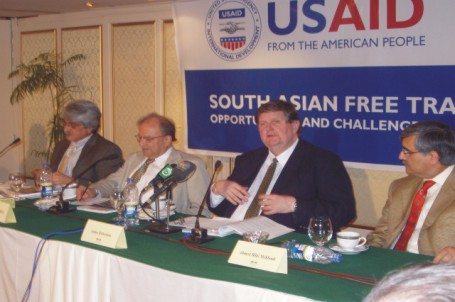|
|
| |
| EVENTS |
|
|
> SAFTA in Pakistan�s Interest
|
| |
|
SAFTA in Pakistan�s Interest
February 03, 2006
Hotel Marriot, Islamabad
|
|
| |
Islamabad, February 03; Former Minister of Finance Shahid Javed Burki believes Pakistan must open trade with India and other South Asian countries as it is in Pakistan�s interest to do that. Mr. Burki, who is serving as the Team Leader and Pakistan Country Expert for the USAID-funded South Asian Free Trade Area - SAFTA Collaboration Project, implemented by Nathan Associates, via the Trade Capacity Building Project, was addressing a Seminar on SAFTA organised in collaboration with Pakistan Institute of Legislative Development And Transparency � PILDAT |
|
| |
Throwing light on the project, Mr. Burki specified that while the project was funded by USAID, independent studies were carried out under it which do not reflect the views of the US government. Having a considerable experience of regional trade agreements (RTAs), Mr. Burki was of the view that while SAFTA was a welcome step for South Asian countries, the agreement was still very conventional in nature and steps needed to be undertaken to bring it line with the rapidly changing realities of global trade and similar agreements elsewhere. Having co-authored the country study on Pakistan alongside Dr. Akbar, Mr. Burki believed that it was increasingly useful for small economies to work together and draw benefit from geographical proximities. South Asia, by not having an RTA was losing out on strong import-export sector. South Asia, he analysed, was unique in the small amount of trade that occurred in countries of the region. One reason for that has been the long standing animosity between India and Pakistan. It is in the two countries� interest to not club together political and trade issues. He emphasised that according to his estimates, Pakistan would see a 10-15 per cent increase in real terms in exports if SAFTA was to be enforced
|
|
| |
Speaking on the issue of trade facilitations, Mr. James Robertson said that trade facilitation was a continuing process. WTO defines RTAs as harmonisation of trade procedures. Agreeing with Mr. Burki, he said that SAFTA, though a welcome development, is a conventional document in outlook. For SAFTA to be a dynamic agreement, it must draw upon other functioning RTAs. Having served as an adviser to the Sri Lankan government, he believed that within SAARC countries there was an enormous potential to reduce the cost of doing business. He said that the active involvement of private sector was a must for trade facilitation. |
|
| |
During the open discussion, Dr. Mohammad Waseem, Chairman Dept. of International Relations said that no movement forward had taken place between Pakistan and India on improving relations. Mr. Burki believed that If New Delhi refuses to move on improving trade relations with Islamabad, Pakistan should make the first move. He feared that if Islamabad did not ratify SAFTA and start its implementation, the lobbies active in India that would prefer to keep Pakistan out of regional business agreements would benefit. He said he had conveyed to an Indian audience earlier that Islamabad did not bear as mush hostility as he experienced towards India in Dhaka, Colombo or Khatmandu and India must capitalise on that. |
|
| |
Commenting on the issue Dr. Salman Shah, Advisor to Prime Minister on Finance said that composite dialogue between India and Pakistan was the on-going process. He believed opening of trade will be through a step-wise approach. He was of the view that the first step should be through opening of borders and increasing tourism opportunities. He highlighted that there were huge issues experienced by Pakistani business in trade with India due to a vast regime of Indian non-tariff barriers (NTBs). |
|
| |
Mr. M. P. Bhandara, Member of the National Assembly and a businessman, believed that there is a general consensus that SAFTA is good for the South Asian countries, however the devil is in its details. Composite dialogue with India should take up the issue of NTBs. India is a tightly controlled economy and is not easy to penetrate. He believed that no homework had been done on two sides before signing SAFTA which must be undertaken before SAFTA is ratified. |
|
| |
Representatives of business and trading houses and associations in Islamabad believed that unless trade is open with India, Pakistan would never know about Indian NTBs. Indian trade barriers are not only a cause of concern for Pakistan but USA and European Union have also expressed their reservations over those. Indians do not want to discuss trade facilitations although India has ratified SAFTA. |
|
| |
Earlier Mr. Ahmed Bilal Mehboob, Executive Director of PILDAT, welcomed the distinguished speakers on behalf of PILDAT. |
|
| |
|
|
| |
|
|
| |

(From left to right) Dr. Salman Shah, Mr. Shahid Javed Burki, Mr. James Robertson, Mr. Ahmed Bilal Mehoob |
|
|
|
|
|
|
|
|